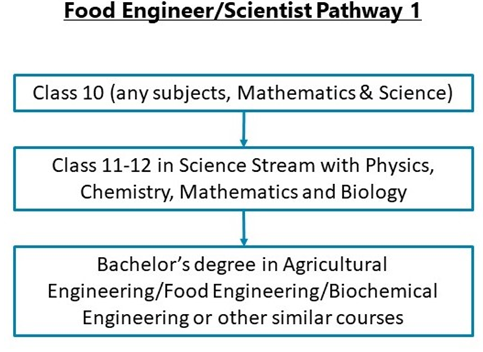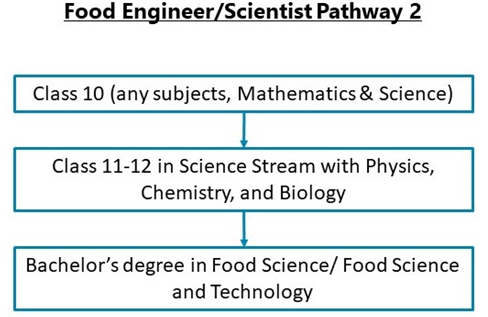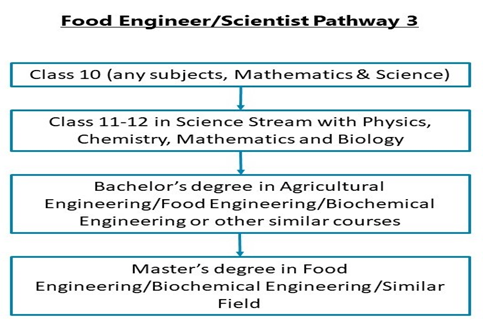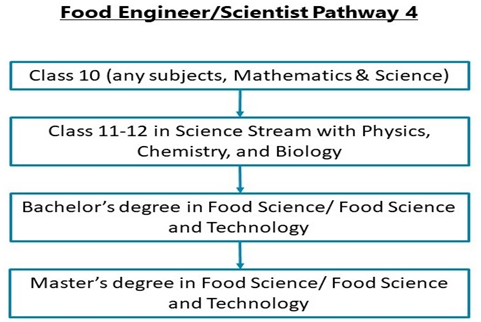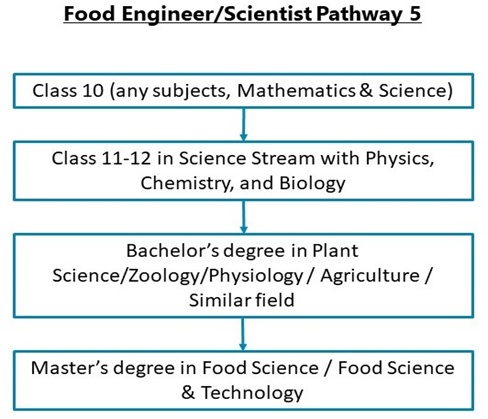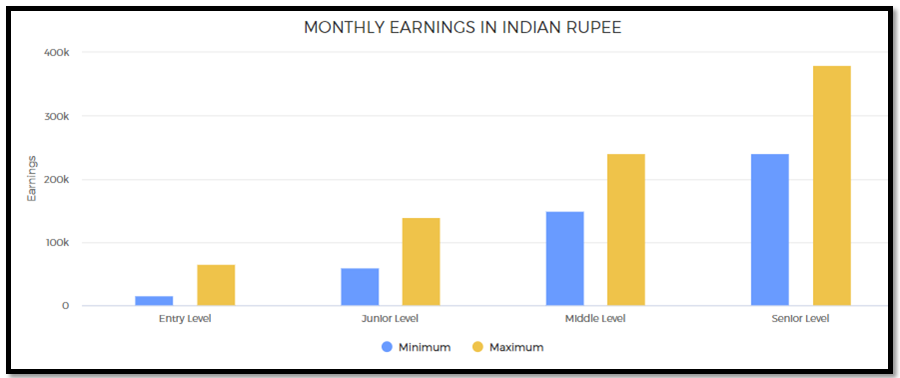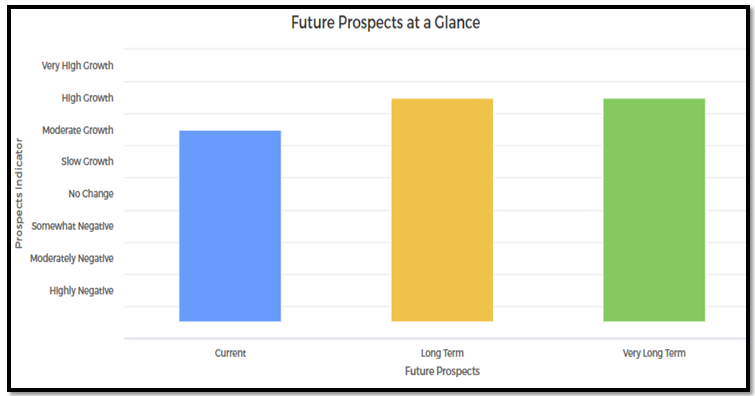Food Engineer/Scientist
Entry Level Qualification
Graduate
Career Fields
Engineering & Technology
For Specially Abled








Career Entrance Exam
JEE MAIN BE/BTECH, JEE ADVANCED, GATE, BITSAT UG, VITEEE BE/BTECH, VITEEE ME/MTECH, SRMJEEE BE/BTECH, SRMJEEE ME/MTECH, TANCET MTECH/MARCH
About Career
Food Engineers and Food Scientists are primarily involved in improving the quality of agricultural crops (which are processed as food for human consumption), developing various processed foods, improving the quality and quantity of various nutrients in processed foods, monitor production of processed foods and control the quality.
As a Food Engineer, you will monitor and handle the operations of food processing and production plants. You will have to ensure that every processed and packaged food product is suitable for human consumption. It will be your duty to apply the knowledge and principles of Biochemical Engineering and food processing to food products to enhance the quality of processed food items. You will be responsible for designing the processing, handling, and packaging equipment/systems. Also, a part of your job responsibility is to find better and more cost-efficient ways to process, preserve, package, and distribute the processed/packed food products.
As a Food Scientist, you will basically be involved in the research and development and quality control/assurance process of food production and manufacturing. Your job will require you to study the chemical composition and structure of food products; monitor the chemical changes that take place in the food products; to find new and enhanced sources of protien and nutrition; to study the effects of food additives on various food items; to develop food substitutes with similar nutrintional value (for example, meat substitutes are made from soybeans), and to monitor and analyze the flavor, texture, and appearance of processed/packaged food products.
Key Roles & Responsibilities
1. To apply the knowledge and principles of the various sciences (microbiology, chemistry, biochemistry, etc.) and engineering to study and understand food processing.
2. To analyze the nutritional content (fat, calories, protein, etc.), colour, flavour and texture of various food items.
3. To discover new food sources and find alternative sources of specific food items.
4. To come up with cost-efficient ways to feed the growing global population.
5. To coordinate and supervise independent laboratory testing.
6. To research and develo ways/techniques to make processed and packaged food products nutritious, healthy, and safe for human consumption.
7. To research and develop methods to enhance or improve certain aspects of foods like flavor, color, texture, and nutritional value.
8. To test different kinds of food samples for moulds, yeast, bacteria, and any other contaminants that may be harmful.
9. To study the chemical changes that occur in processed/packaged/stored food items.
To carefully record and document all research data for future use.
10. To collaborate with Food Engineers or Scientists (depending upon your job designation) and microbiologists, packaging specialists, etc., to develop better ways of selecting, preserving, processing, packaging, and distributing food products.
11. To inspect food processing plants to monitor and check if they meet the sanitary and waste management protocol.
12. To ensure that all the food manufacturing processes conform with industry standards and government regulations.
13. To evaluate existing equipment and systems and perform troubleshooting tasks for any glitches in the systems.
14. To research, design, and implement innovative and cost-efficient methods of manufacturing that fulfil both customer and regulatory requirements.
Career Entry Pathway
Class 10 with any subjects, Science and Mathematics - Class 11-12 in Science stream with Physics, Chemistry, Mathematics, and Biology - Bachelor’s degree in Agricultural Engineering/Food Engineering/Biochemical Engineering or other such similar courses
After completing your secondary level school studies (class 10), you can pursue your higher secondary level studies in Science stream with a subject combination of Physics, Chemistry, Mathematics, and Biology. Then you can pursue your graduation with a Bachelor’s degree in Agricultural Engineering/Food Engineering/Biochemical Engineering or other such similar courses.
Class 10 with any subjects, Science and Mathematics - Class 11-12 in Science stream with Physics, Chemistry, and Biology - Bachelor’s degree in Food Science/ Food Science and Technology
After completing your secondary level school studies (class 10), you can pursue your higher secondary level studies in Science stream with a subject combination of Physics, Chemistry, and Biology. Then you can pursue your graduation with a Bachelor’s degree in Food Science / Food Science and Technology.
Class 10 with any subjects, Science and Mathematics - Class 11-12 in Science stream with Physics, Chemistry, Mathematics, and Biology - Bachelor’s degree in Agricultural Engineering/Food Engineering/Biochemical Engineering or other such similar courses - Master’s degree in Food Engineering/Biochemical Engineering
After completing your secondary level school studies (class 10), you can pursue your higher secondary level studies in Science stream with a subject combination of Physics, Chemistry, Mathematics, and Biology. Then you can pursue your graduation with a Bachelor’s degree in Agricultural Engineering/Food Engineering/Biochemical Engineering or other such similar courses, and follow it up with a Master’s degree either in Food Engineering or in Biochemical Engineering.
Class 10 with any subjects, Science and Mathematics - Class 11-12 in Science stream with Physics, Chemistry, and Biology - Bachelor’s degree in Food Science/ Food Science and Technology - Master's degree in Food Science / Food Science & Technology
After completing your secondary level school studies (class 10), you can pursue your higher secondary level studies in Science stream with a subject combination of Physics, Chemistry, and Biology. Then you can pursue your graduation with a Bachelor’s degree in Food Science / Food Science and Technology followed by a Master's degree in Food Science / Food Science & Technology.
Class 10 with any subjects - Class 11-12 in Science stream with Physics, Chemistry, and Biology - Bachelor’s degree in Plant Science/Zoology/Physiology / Agriculture - Master’s degree in Food Science/Food Science & Technology
After completing your secondary level school studies (class 10), you can pursue your higher secondary level studies in Science stream with a subject combination of Physics, Chemistry, and Biology. Then you can pursue your graduation with a Bachelor’s degree in Plant Science/ Zoology/ Physiology / Agriculture/ or in a similar field, and follow it up with a Master’s degree in Food Science/Food Science & Technology.
Required Qualification & Competencies
To become a Food Scientist/Technologist, you can do a Bachelor degree in Food Engineering / Biochemical Engineering / Food Technology / Agricultural Engineering or in a related field. To become a Food Scientist do a Bachelor degree in Food Science or a Bachelor degree in Plant Sciences, Zoology, Physiology, or in a similar field and then do a Master degree in Food Science. After your Bachelor degree, you may opt for Master's degree.
MINIMUM EDUCATION REQUIRED | MAXIMUM EDUCATION REQUIRED |
Under Graduate | Doctoral |
COMPETENCIES REQUIRED
Interests
1. Investigative: You should have interests for Investigative Occupations. Investigative occupations involve working with ideas and quite a lot of thinking, often abstract or conceptual thinking. These involve learning about facts and figures; involve use of data analysis, assessment of situations, decision making and problem solving.
2. Realistic: You should have interests for Realistic Occupations. Realistic occupations involve more practical and hands-on activities than paperwork or office work. Realistic occupations often involve physical activities for getting things done using various tools and equipment.
Abilities
1. Abstract Reasoning: The ability to understand ideas which are not expressed in words or numbers; the ability to understand concepts which are not clearly expressed verbally or otherwise.
2. Deductive Reasoning: The ability to apply general rules and common logic to specific problems to produce answers that are logical and make sense. For example, understanding the reasons behind an event or a situation using general rules and common logic.
3. Inductive Reasoning: The ability to combine pieces of information from various sources, concepts, and theories to form general rules or conclusions. For example, analysing various events or situations to come out with a set of rules or conclusions.
4. Inter-Personal: The ability to build and maintain good relationships with others at workplaces and elsewhere.
5. Naturalistic Intelligence: The ability to recognise different flora and fauna of the world; sensitivity towards nature and natural surrounding; sensitivity towards the needs of different flora and fauna.
6. Numerical Reasoning: The ability to add, subtract, multiply, divide, and perform other basic numerical calculations correctly.
7. Originality: The ability to come up with unusual or innovative ideas about a given topic or situation, or to develop creative ways to solve a problem.
8. Spatial Ability: The ability to visualise three dimensional objects by looking at the objects in paper or visualise objects mentally in three dimensions.
9. Verbal Reasoning: The ability to think and reason with words; the ability to reason out ideas expressed in words.
10. Written Comprehension: The ability to read and understand information and ideas presented in writing.
Knowledge
1. Biological Sciences: Knowledge of plants and animals, their anatomical structure, cell structure, tissues, physiological functions, evolution, and all other related aspects.
2. Chemical Science: Knowledge of the chemical composition, structure, and properties of substances and of the chemical processes and transformations that they undergo. This includes uses of chemicals and their interactions, toxicity, production techniques, and disposal methods.
3. Engineering and Technology: Knowledge of various applications of one or more branches of Engineering Science & Technology to manufacture and produce various goods or construct or erect various structures. This include knowledge about design, development, prototype testing, manufacturing, construction, installation, repair and maintenance (relevant for Food Engineers and Technologists).
4. Physical Science: Knowledge of physical principles, laws, their interrelationships, and applications to understand fluid, material, earth, ocean, atmosphere, and space dynamics, as well as mechanical, electrical, atomic and sub- atomic structures, properties and processes (relevant for Food Engineers and Technologists).
5. Technical and Engineering Design: Knowledge of various techniques, methods, specifications and tools for creating, developing and laying out designs of various machines, equipment, devices, manufacturing plants, structures, systems and processes. This includes developing blueprints, drawing and models (relevant for Food Engineers and Technologists).
Skills
1. Active Learning: Focused and continuous learning from various sources of information, observation and otherwise for application in getting work done.
2. Coordination: Skills in working together with other people to get things done.
3. Critical Thinking: Skills in analysis of complex situations, using of logic and reasoning to understand the situations and take appropriate actions or make interpretations and inferences.
4. Judgment and Decision Making: Skills in considering pros and cons of various decision alternatives; considering costs and benefits; taking appropriate and suitable decisions.
5. Operations and Process Analysis: Skills in analysis of operations and processes such as industrial manufacturing, chemical processing, etc. so as to device better and more efficient operational processes and systems (relevant for Food Engineers and Technologists).
6. Problem Solving: Skills in analysis and understanding of problems, evaluating various options to solve the problems and using the best option to solve the problems.
7. Process and Operation Controlling: Skills in controlling processes and operations of various machines, equipment, devices and systems using different types electrical and electronic control instruments and systems (relevant for Food Engineers and Technologists).
8. Quality Control Analysis: Skills in conducting tests and inspections of products, services, or processes to evaluate quality or performance.
9. Reading Comprehension: Skills in understanding written sentences and paragraphs in work related documents.
10. Scientific: Skills in using various scientific rules and methods to get things done or solve problems.
11. Technical: Skills in using various technologies and technical methods to get things done or solve problems.
12. Technical Design and Drawing: Skills in creating and developing designs and drawings for various structures, machines, equipment, and devices (relevant for Food Engineers and Technologists).
Personality
1. You are always or mostly organized in your day-to-day life and activities.
2. You are a soft-hearted person sometimes.
3. You trust others sometimes but not always.
4. You are helpful to others sometimes.
5. You prefer to experience new things and have new experiences sometimes.
6. You act independently sometimes but do not do so in some other times.
Career - Job Opportunities & Profiles
1. As a Food Scientist, you can get job opportunities in various food research institutions.
2. As a Food Engineer, you can find jobs in food processing companies like Gujarat Cooperative Milk Marketing Federation Ltd. (Amul), Godrej Tyson Foods (Godrej Agrovet), Venkatesh Agro Processing Company, to name a few.

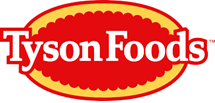
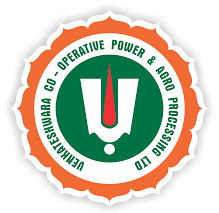
3. Apart from industry roles, you may also go into research and academic roles in Universities offering various courses in Food Sciences/Food Engineering or any other related courses. Such job roles would involve both research and teaching about the various sciences mentioned above.
4. Another alternative job pathway in this field would be that in Nutrition/Nutrition Sciences/Applied Nutrition. If you have a degree in these particular specializations, you can find job opportunities in hospitals, hotels, luxury cruises, and any other institution/organization where food is cooked and served.
Work environment
Food Engineers spend a significant amount of time working in food processing plants, whereas Food Scientists basically work in office or lab settings since their primary work invovled R&D. They work nearly 9-10 hours. However, they might have to work extra hours or during the weekends to meet deadlines. Traveling to food processing project sites is a part-and-parcel of their job.
SPECIALISATION TRACKS IN THIS CAREER
1. Food Chemist
Food Chemists are professionals who apply various scientific principles to breakdown the content of food to determine its chemical composition. They use various combinations of chemicals to enhance the flavor blends of food and beverage items. They may work either in laboratories or in food processing plants to synthesize new and alternative food sources and to develop ways to preserve natural foods that reduce the loss of nutrients.
2. Food Microbiologist
Food Microbiologists study various microorganisms and their beneficial and harmful effects on the quality of both processed and raw food products. Like Food Chemists, they too develop new food products, conduct microbiological and chemical tests on food items, design the production process for food items, determine their shelf life, among other things. However, their primary job responsibility is to identifying different kinds of food-borne microorganisms and work on disease prevention.
3. Food Biochemist
Food Biochemists focus on studying the chemical processes in all living organisms, including their DNA structure, hereditary aspects, and cell development. It is their duty to decode how specific chemical reactions occur in cells, tissues, etc. In other words, they seek to improve the quality of human life by understanding the workings of living organisms at the cellular/molecular level.
4. Flavour Chemist
A Flavour Chemist uses the knowledge and principles of chemistry to develop unique flavors using both natural and synthetic approved flavor chemicals and extracts. They focus on mimicking or modifying the olfactory and taste properties of various food items while also creating new smells and flavors. Flavor chemists also seek to understand how the chemistry of cooking generates specific taste and aroma and how to develop various flavor profiles using particular parameters for heat and pressure.
5. Biochemical Engineer
Biochemical Engineers study the natural chemical functions of living organisms and then apply the knowledge of biology, chemistry and engineering to develop new and unique food products. The are responsible for researching, developing, documenting, and producing such food products that are obtained from a blend of organic and lab-made raw materials that can solve the food crisis for the growing population.
6. Food Engineer
Food Engineers are professionals who specially deal with food production and processing systems. They are engaged in the entire process of conversion of raw food material into processed and packaged finished products. Moreover, they are also in charge of designing food production and processing equipment/systems.
7. Pomologist (Fruit Scientist)
Pomology is a branch of Botany that exclusively deals in the study and cultivation of the various types of fruits and the scientists who are involved in this field of study are known as Pomologists. Pomologists primarily focus on studying the development, enhancement, cultivation and physiological attributes and aspects of different kinds of fruit trees and species. Their goal is to find ways to enhance the fruit quality, regulate fruit production periods, and to minimize production costs.
8. Vegetable Scientist
Vegetable Scientists study Olericulture - the science of vegetable cultivation and usage of the edible parts of vegetables for food. Their job focuses on the production, storage, processing, and marketing of various kinds of vegetables. Vegetable Scientists also have to care for and maintain vegetable crops (both non-traditional and commercial crop production) through a mix of a variety of methods including organic farming and gardening, sustainable agriculture and horticulture, hydroponics, and biotechnology.
CAREER GROWTH
If you choose to be a Food Engineer, you will begin your career as a Graduate Engineer Trainee. The next step up the ladder would be that of an Assistant Engineer. After about 8-10 years of service, you can upgrade to the level of a Senior Engineer and further to Plant Engineer. Once you gain around 12-20 years of experience, you can get promoted to General Manager, and ultimately become the Vice President of a company.
If you become a Food Scientist, you will begin your career as a Junior Scientific Assistant, and then upgrade to the level of a Senior Scientific Assistant. After this, you will gradually climb up the hierarchy as you gain more and more experience - from Senior Scientific Assistant you will upgrade to Scientist A, then to Scientist B, and then to Scientist C. After that, you will get promoted to Scientist E-I, then to Scientist E-II, and then finally to Scientist F. Going forth, you may also become the Director or Project Director.
Salary Offered
1. The starting salary of a Food Engineer will be anywhere around Rs. 35,000 - 65,000 per month. After about 6-8 years, their average monthly salary will be around Rs. 60,000 - 1,40,000. After 10-15 years, they would earn around Rs. 1,50,000 - 2,40,000 per month. And after 17-20 years of experience, their monthly salary would top at around Rs. 2, 40,000 - 3,80,000.
As for Food Scientists who begin their career directly after PhD, they can Rs. 70,000 - 80,000 per month. After about 6-8 years, their average monthly salary will be anywhere between Rs. 1,20,000 - 1,40,000. After 10-15 years, they will earn nearly Rs. 1,80,000 - 2,10,000. And after 15-20 years of service, their monthly salary will range between Rs. 2,20,000 - 2.50,000.
3. The starting salary for Assistant Professors is Rs. 70,000 - 80,000 per month. Once they get promoted to Associate Professor, they can earn around Rs. 1,20,000 - 1,60,000 per month. For Professors, the average monthly salary ranges between Rs. 1,70,000 - 2,40,000.
4. In the beginning of their career, Nutritionists can earn anywhere between Rs. 15,000 - 25,000 per month. Gradually, as they gain experience, their average monthly salary ranges between Rs. 30,000 - 45,000.
MONTHLY EARNINGS IN INDIAN RUPEE
1. Entry level: 0 - 2 years of work experience
2. Junior Level: From 1 to 12 years of work experience
3. Mid Level: From 5 to 20+ years of work experience
4. Senior Level: From 10 to 25+ years of work experience (there could be exceptions in some high-end technical, financial, engineering, creative, management, sports, and other careers; also in the near future, people will reach these levels much faster in many careers and in some careers, these levels will have no meaning as those careers will be completely tech skill driven such as even now, there is almost no level in a Cyber Security Expert’s job).
Work Activities
1. Analysing and interpreting data and information: Analysis of data and information to find facts, trends, reasons behind situations, etc.; interpretation of data to aid in decision making.
2. Communicating with co-workers and others: Communicating with people in writing, verbally or otherwise inside your workplace and various other people who have professional relationships with your place of work including vendors, government officials, etc. or with people at large.
3. Decision making and problem solving: Analysis of data and information; evaluation of alternative decisions and results of decisions; taking the right decisions and solving problems.
4. Getting Information and learning: Observing, hearing, reading, using computers, or otherwise obtaining information and learning from it.
5. Inspecting equipment, systems, structures, and materials: Inspecting equipment, systems, structures, and materials to ascertain quality, performance, defects, causes of errors, etc.
6. Inspecting situations, events, and people: Inspecting situations, events and people to understand the reasons and causes for the situation or events to happen; inspecting people to understand reasons behind their behaviour and actions.
7. Organising, planning and prioritising tasks: Planning and organising tasks in order to achieve work goals; prioritising tasks to achieve goals and making the best use of the time available.
8. Updating and using relevant knowledge: Keeping updated with the latest knowledge relevant to your fields of work and use of the relevant knowledge in getting things done.
9. Using computers for work: Using computers for day-to-day office work; using computer software for various applications in day-to-day professional work; entering data and process information; for writing.
10. Working in a team: Working in a team of people; developing team; maintaining professional relationships among team members.
Future Prospects
According to the IBEF (India Brand Equity Foundation) statistics, the Indian Food and Food Processing Industry are expanding rapidly. Accounting for nearly 32% of the country’s total food market share, the Indian Food Processing Industry has grown to become one of the largest industries in the country. The Confederation of Indian Industry (CII) predicts that over the next ten years, Food Processing Industry has the potential to attract an investment of around US$ 33 billion while also simultaneously generating huge employment opportunities.
FUTURE PROSPECTS AT A GLANCE


